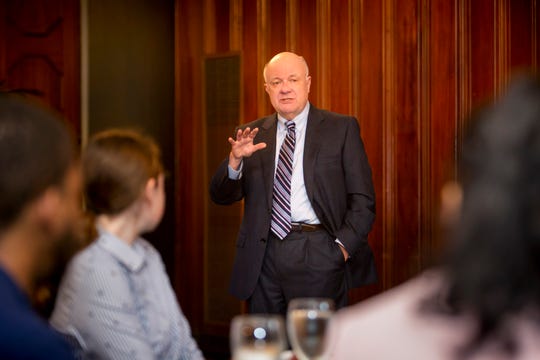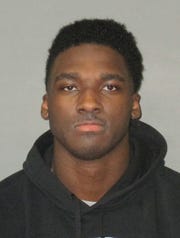LSU administrator gave rapists, stalkers and other Title IX violators slaps on the wrist
For years, the LSU administrator in charge of doling out punishments to rapists, stalkers and abusers regularly chose to issue the lowest possible sanctions, regardless of the severity of the alleged acts, a USA TODAY investigation has found.
In more than half the Title IX cases referred to him for punishment over the past four school years, Associate Dean of Students and Director of Student Advocacy and Accountability Jonathan Sanders imposed sanctions that allowed guilty students to continue their coursework uninterrupted, instead of opting for more severe penalties, such as suspension or expulsion. During that time, Sanders expelled just one student.
On top of this lenient approach, several women told USA TODAY that Sanders added to their trauma by disciplining them for minor, unrelated infractions or questioning them in ways that cast doubt on stories already found to be credible by Title IX investigators.
One female student told USA TODAY that Sanders questioned her about what clothes she was wearing the night she said a male student raped her while she was unconscious. She reiterated her claims to investigators hired by LSU to review its handling of abuse cases.
Two other female students said Sanders failed to contact witnesses in their cases against a fraternity member they reported for sexual assault in 2019.
Jonathan Sanders, LSU Director of Student Advocacy and Accountability (Photo: LSU)
In 2018, Sanders was one of the officials who led the university’s response to allegations that football player Drake Davis violently beat tennis player Jade Lewis. During an investigation into one alleged beating, staff members reported finding a candle in Lewis’ dorm room, a violation of housing rules. The officials wasted no time citing Lewis for the candle, even as the case against her attacker dragged on for several more months. Davis later pleaded guilty in court to two assaults.
Sanders declined to be interviewed for this story. Through an LSU spokesman, Sanders defended his record on sanctions for sexual offenders, saying the punishments he issued were harsher than those of his predecessor. He also denied asking a student what she was wearing.
In an email, Sanders also disputed several aspects of the Husch Blackwell report released two weeks ago that criticized his handling of specific cases, saying the law firm in some cases made errors or took his words out of context.
Husch Blackwell is the firm LSU hired in November to investigate its handling of sexual misconduct allegations in response to reporting by USA TODAY.
LSU did not discipline Sanders after the Husch Blackwell report. Only two athletic department administrators – Executive Deputy Athletic Director Verge Ausberry and Senior Associate Athletic Director Miriam Segar – have faced accountability from LSU for contributing to a systemic failure to appropriately respond to dating violence and sexual assaults. They were suspended without pay for 30 and 21 days, respectively.
LSU Interim President Tom Galligan told USA TODAY on March 10 he had “no idea” why LSU had taken a lenient approach to disciplining sexual offenders in the past, but said he expects the school to issue more expulsions and suspensions going forward.
When asked whether Sanders would continue to head LSU’s accountability office, Galligan said he was not sure.
“I would have to definitely – we will review that,” Galligan said. “I would say, though, that everyone is existing in a culture where signals from the top are not – and maybe not the president, I think the president did make statements about Title IX enforcement – but other messages from the top in various departments were not clear.
“There was not a culture of enforcement and accountability.”
Louisiana State University interim president Thomas Galligan (Photo: Katherine Seghers/LSU)
‘Worthless’ punishments
From the 2016-2017 school year through the 2019-2020 school year – while Sanders was in charge of issuing sanctions in Title IX cases – LSU found 46 students responsible for Title IX offenses, data obtained from LSU by USA TODAY show.
Title IX offenses include rape, sexual assault, sexual harassment, dating and domestic violence and stalking.
Out of 46 students found responsible, LSU expelled just one. It suspended 18 and gave lesser sanctions to 27.
Of the 27 issued lesser sanctions, 14 students received probation, 11 received deferred suspensions and two received warnings.
Under LSU policy, deferred suspensions, probation and warnings do not necessitate removal from classes or from campus. Deferred suspensions only result in actual suspensions if the student is found responsible for a subsequent violation.
A USA TODAY review of student disciplinary records from other comparably-sized institutions, obtained by USA TODAY via public records requests, shows that LSU’s punishments to sexual offenders were far more lenient.
From 2014 through mid-2019, Ohio State expelled 28 students – about 60% of those found responsible for sexual offenses in that time. Michigan State found 37 students responsible and expelled 16, or 43%. University of Central Florida found 34 responsible and expelled 12, or 35%.
At Ohio State, 24% of students disciplined for sexual offenses received sanctions less severe than a suspension. It was 19% at Michigan State and 9% at UCF.
By comparison, 59% of LSU students disciplined for Title IX offenses received lesser sanctions while Sanders was in charge of their punishments.
In other words, LSU allowed three of every five students found responsible for a Title IX offense to continue their coursework without interruption.
LSU deferred the suspension of one student found responsible for sexual misconduct, sexual harassment and unauthorized surveillance, the data show. It meted out the same punishment to another student found responsible for stalking, harassment, and endangerment. One was assigned a course on ethics and decision making, and both were required to attend anger management class.
The data does not include the names of the disciplined students, which LSU refused to release, or narratives of the incidents. “Sexual misconduct” encompasses rape, sexual assault, sexual exploitation and other nonconsensual sexual offenses.
The only student expelled under Sanders’ purview was Davis, who was found responsible for endangerment, disorderly conduct and residential life guest visitation violations. Sanders expelled him in July 2019 – 10 months after he’d already withdrawn from the school. By then, Davis had already been criminally convicted.
Former LSU wide receiver Drake Davis' booking photo from the East Baton Rouge Sheriff's Office. (Photo: East Baton Rouge Sheriff's Department)
Sanders told Husch Blackwell that his sanctions were determined by an “Outcomes Guide,” which outlines a range of potential punishments for each type of offense. But LSU’s menu of sanctions was unlike those of other schools, Husch Blackwell noted in its report.
Instead of looking at the severity of the offense, the victim’s wishes and whether the student found responsible admitted fault, LSU’s sanctions were based on the number of times the student had been found responsible for the same offense.
For first violations of the vast majority of offenses – including sexual misconduct, sexual harassment and stalking – the minimum sanction was probation or a deferred suspension, according to LSU’s 2020-21 Outcomes Guide. Suspensions and expulsions were permitted for first-time offenders, but USA TODAY’s review found that, the majority of time, Sanders instead elected probation and deferred suspensions.
That runs counter to the university’s own website, which states that probation is typically reserved for first-time offenses that are “not serious in nature.”
In at least one case, Sanders chose a punishment lighter than what the university’s guide prescribed. His office found a fraternity member had sexually assaulted two students in separate incidents. Sanders issued a deferred suspension, allowing him to stay in school, and ordered him to attend an anger management class.
Caroline Schroeder, one of the two students who reported the fraternity member, called the punishment “worthless,” especially for someone found to have sexually assaulted two women.
“At that point, it’s a clear pattern. It’s likely to happen again,” Schroeder told USA TODAY. “And if the whole point of the process is to make sure that these things don’t keep happening, you’d think you’d want to be pretty serious with that first one.”
According to university spokesman Jim Sabourin, Sanders said he was not aware of the Outcomes Guide’s origin, but that it dates at least as far back as 2011, before he began as director of student accountability.
Sanders began his LSU career as assistant director of Greek Life in 2006, his LinkedIn profile shows. He was promoted to associate director of Greek Life in 2009, and then again to assistant dean in 2013. He remained the Greek Life associate director until his transition to accountability director in September 2016.
Until August, LSU handled sexual misconduct and gendered violence complaints in a complex, multi-step process, far more complicated than most other schools.
First, a Title IX investigator probed the allegations and determined whether the accused student was responsible. The findings could be appealed to the Title IX coordinator. The case was then forwarded to Sanders’ office for additional investigation and sanctions. After that, the student could request a rehearing of the case by a panel consisting of faculty and students. Even still, the hearing panel results could be appealed and overturned by high-level administrators, including the Dean of Students or even the president.
“This is a byzantine practice which at best confused student participants and at worst pointlessly prolonged case resolution and potentially re-traumatized the parties,” Husch Blackwell wrote in its report to the university. “It also required additional institutional resources for an area that was already understaffed.”
LSU updated its sexual misconduct policies last year in response to new Title IX regulations issued by the Trump administration. Now, sanctions are determined by a university hearing panel, instead of Sanders’ office.
Sanders’ office is still tasked with issuing discipline in cases of non-gender-based offenses, including physical abuse and hazing.
Candle and wine violations
Husch Blackwell saved some of its harshest criticism for the way Sanders handled reports that Davis was physically abusing his then-girlfriend, Lewis.
Although Davis admitted in a June 2018 interview with LSU’s Title IX investigator that he had “punched (Lewis) in the stomach” during an argument, Sanders chose not to temporarily suspend Davis while the university investigated, nor did he issue a no-contact or other protective order to separate them. Husch Blackwell described this approach as “way too passive.”
Asked by Husch Blackwell about this decision, Sanders said he and other officials were reluctant to issue a no-contact order because they knew Lewis would violate it, and they “didn’t want to have to charge her.” But as the law firm noted, LSU charged Lewis with other offenses, which could be construed as retaliatory.
For instance, within two days of discovering a candle in Lewis’ apartment during an investigation into alleged dating violence, LSU found her responsible for violating the residence life campus handbook. By contrast, the school waited nearly three months to charge Davis with conduct code violations for beating her on multiple occasions.
Sanders told Husch Blackwell that issuing Lewis candle-related charges was a way of trying “to engage” with her, “to try and address the behavior with Drake.” Husch Blackwell called this decision “misguided” and noted that LSU had an amnesty policy in place that should have been invoked in this instance, but wasn’t. In addition, the law firm said LSU appears to have made no other interventions to ensure Lewis’ safety.
“Disciplining a victim of dating violence for having a candle in her room – which was discovered through an investigation into a report of dating violence – sends a troubling message to victims of abuse and misconduct which does not encourage reporting to the University,” Husch Blackwell noted.
““Disciplining a victim of dating violence for having a candle in her room – which was discovered through an investigation into a report of dating violence – sends a troubling message to victims of abuse and misconduct which does not encourage reporting to the University."”
Two months after the candle incident, LSU separately held Lewis responsible for having a bottle of wine in her campus apartment, another residence hall violation. It informed her of this the same day she reported numerous acts of dating violence by Davis to campus police.
“We decided to charge Drake and Jade and move forward with possible Code violations under the Code in hopes that one of them would be truthful about what occurred during the evening in question,” Sanders said in his statement to USA TODAY. “This decision was made in consultation with Dean of Student (Deputy Title IX Coordinator), General Counsel (Tom Skinner), and (Title IX Coordinator) Jennie Stewart.”
Fraternity member
The case against the fraternity member seemed straightforward.
He had been found responsible by LSU’s Title IX office for sexually assaulting two female students on a bus ride back from a fraternity party in October 2016. Both reported that he ripped open or put his hands up their shirts and touched them without their consent. The verdict was upheld at every stage of the appeals process.
Yet when Schroeder and Elisabeth Andries met with Sanders for what they thought was to be a discussion about their abuser’s punishment, Sanders peppered the women with questions, like he was investigating the assaults anew. Even though the Title IX office had already made a determination in their cases and denied his first appeal.
Elisabeth Andries, a junior at Louisiana State University, is an industrial engineering student. Andries was sexually assaulted by a LSU fraternity member on a bus trip. The man was later was in like-major classes with her. After reporting the incident to the university, Andries' Title IX case dragged out and she was not given accommodations to avoid classes with her abuser. (Photo: Alex Mousan for USA TODAY)
“He… makes you go through the whole report again and tries to find… inaccuracies or something. I don’t know what the point of him was,” Andries told Husch Blackwell. “He asked me if I was on other drugs or on anything else other than alcohol? And I looked at him and I was like, ‘Would it have mattered at this point?’ And he was just like, ‘Well, I find it hard to believe that [this happened while] you were on a public bus with people.’
“And I was like, ‘Well, me too.’”
Andries also told Sanders she knew of a third woman who said she, too, had been sexually assaulted by the fraternity member. She and Schroeder also urged Sanders to call the fraternity president at the time they were assaulted.
But Sanders contacted the wrong fraternity president. And he never reached out to the third woman, Andries told USA TODAY and Husch Blackwell, which, if true, violates federal and LSU Title IX policies.
Sanders disputed not reaching out to the woman, saying that LSU’s Title IX investigator, Jeffrey Scott, contacted her, but she declined to make a statement.
Sanders issued sanctions against the fraternity member: a meeting on anger management and healthy relationships, a course on ethics and decision-making, and a deferred suspension for four semesters.
Husch Blackwell noted that, based on LSU’s Outcomes Guide, Sanders should have at least suspended, if not expelled, the fraternity member because he’d been found responsible for two sexual misconduct violations.
Both the fraternity member and Schroeder appealed the decision, with Schroeder objecting to the light sanctions. Andries was so fed up with the process, she said, she opted not to pursue it further.
“It was already three appeals deep,” Andries said. “I don’t know where this ends.”
In September 2019, a hearing panel voted to increase the fraternity member’s punishment, suspending him for two semesters and banning him from campus. His final appeal was denied in October 2019 – nearly seven months after the Title IX investigation started.
Schroeder told USA TODAY she believes LSU’s Title IX process intentionally wears victims down until they give up.
“I think it’s all designed so that everybody just gives up and goes home,” she said.
‘What I was wearing’
Andries’ and Schroeder’s experiences echo that of another woman, Sidney, who reported being raped by her friend, a male student, in 2018.
Sidney agreed to use her first name only for this story. She spoke to USA TODAY last year and shared documents from her Title IX case. She also spoke to Husch Blackwell, though investigators did not analyze the handling of her case in their report.
Sidney said that after a night of drinking in 2018, she slept over at the friend’s house and woke up in the middle of the night to him raping her. When she reported the assault to LSU, she brought evidence, she said: She had a rape kit examination done, and she shared with LSU screenshots of a text exchange after the incident, in which she told the friend she was too drunk to have sex, and he laughingly apologized.
Two months after the incident, the Title IX investigator found the male student responsible for sexual misconduct. His first appeal was denied, and the case was forwarded to Sanders to impose sanctions.
Nearly a month later, Sidney got an email from Sanders, asking if she could meet. He pushed the date back multiple times after that for several weeks.
“He obviously didn’t really care about trying to meet with me,” Sidney said. “It was more like, ‘This is something I have to do, but I’m just going to wait until it’s convenient for me to do it.’”
When they finally did meet, Sidney said Sanders tried to poke holes in her story, even though the Title IX office had already reached a decision in her case twice.
“His tone of voice and the questions he asked me were basically like, ‘So this is your fault that this happened,’” Sidney said. “He asked a lot of questions like what I was wearing, and how much I’d had to drink, and that kind of thing. The kinds of questions that are like – I guess it’s maybe relevant, but like not really. Like what I was wearing, that doesn’t matter.”
Sanders denied asking Sidney what she was wearing.
Sanders issued the male student a one-year suspension, but he appealed to a university hearing panel. Because of the delays and the school calendar, the panel’s decision came with just one week left of school.
Sidney was stunned when the panel overturned the suspension, instead allowing the student to complete the semester, his last at the school. Sidney said a member of the panel told her it was best to just “let him graduate and then not see him again.”
“I said, ‘That’s not the point,’” Sidney said. “The point is he did this and nothing happened.”
Source: Read Full Article




